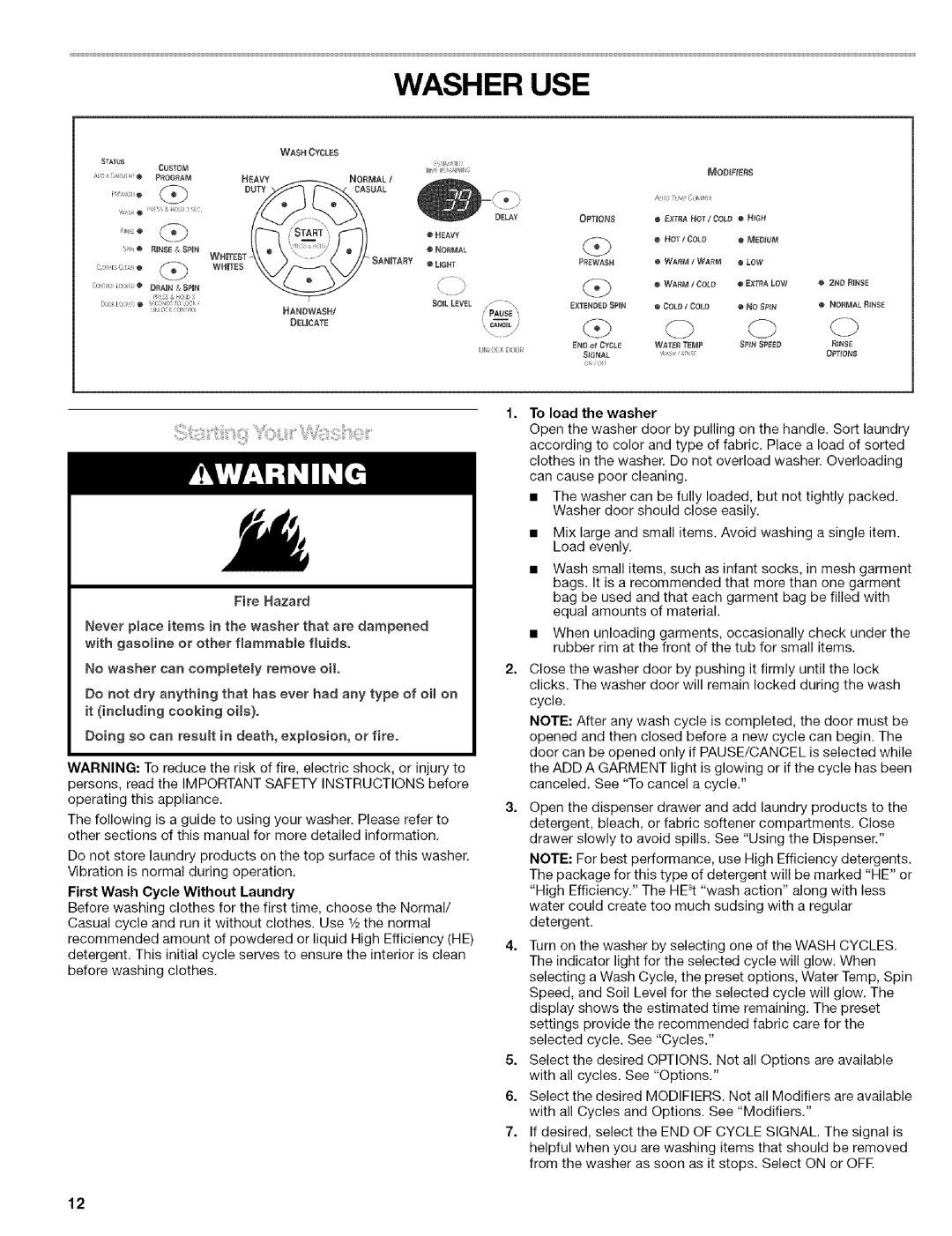
WASHER USE
WASH CYCLES
FSlB_¢,_;Eb
NORMAL/ |
|
|
|
|
|
|
|
| MODIFIERS |
|
| |
|
|
|
|
|
|
|
|
|
|
|
| |
CASUAL |
|
|
|
|
|
|
|
|
|
|
|
|
|
|
| DELAY | OPTIONS | O | EXTRA | HOT / SOLD | 0 HIGt4 |
|
| ||
| e | HEAVY |
|
| HOT / | COLG | O MEDIUM |
|
| |||
|
|
|
|
|
|
|
| |||||
| 0 | NORMAL |
|
|
|
|
|
|
|
|
| |
SANITARY | o | LIGHT | PBEWASH | • | WARM | / | WARM | • LOW |
|
| ||
|
| /" | X |
| 0 | WARM | / | COLD | O EXTRA LOW | 0 | 2ND RrNSE | |
|
|
|
|
| ||||||||
HANDWASHi |
| SOIL | LEVEL //PAUSE_ | EXTENGEb SPIN | 0 COLD | / COL;9 | _ NO SPIN | ® | NORMAL RINSE | |||
|
|
|
|
|
|
|
|
| ||||
DELmCATE |
|
|
|
|
|
|
|
|
|
|
|
|
|
|
| UN O(K D)OR | ENG _f CYCLE | WATER | TEMP | SPIN SPEED |
| R_NEE | |||
|
|
| SIGNAL | ,_,_l_ i_i!,_ |
|
|
| OPTIONS | ||||
|
|
|
|
|
|
| ||||||
F{re Hazard
Never place items in the washer that are dampened with gasoline or other flammaMe fluids,
No washer can completemy remove oil
Do not dry anything that has ever had any type of oH on it (including cooking oims).
Doing so can result in death, explosion, or fire.
WARNING: To reduce the risk of fire, electric shock, or injury to persons, read the IMPORTANT SAFETY INSTRUCTIONS before operating this appliance.
The following is a guide to using your washer. Please refer to other sections of this manual for more detailed information.
Do not store laundry products on the top surface of this washer. Vibration is normal during operation.
First Wash Cycle Without Laundry
Before washing clothes for the first time, choose the Normal/ Casual cycle and run it without clothes. Use Y2the normal recommended amount of powdered or liquid High Efficiency (HE) detergent. This initial cycle serves to ensure the interior is clean before washing clothes.
To load the washer
Open the washer door by pulling on the handle. Sort laundry according to color and type of fabric. Place a load of sorted clothes in the washer. Do not overload washer. Overloading can cause poor cleaning.
•The washer can be fully loaded, but not tightly packed. Washer door should close easily.
•Mix large and small items. Avoid washing a single item. Load evenly.
•Wash small items, such as infant socks, in mesh garment bags. It is a recommended that more than one garment bag be used and that each garment bag be filled with equal amounts of material.
•When unloading garments, occasionally check under the rubber rim at the front of the tub for small items.
2.Close the washer door by pushing it firmly until the lock clicks. The washer door will remain locked during the wash cycle.
NOTE: After any wash cycle is completed, the door must be opened and then closed before a new cycle can begin. The door can be opened only if PAUSE/CANCEL is selected while the ADD A GARMENT light is glowing or if the cycle has been canceled. See "To cancel a cycle."
3.Open the dispenser drawer and add laundry products to the detergent, bleach, or fabric softener compartments. Close drawer slowly to avoid spills. See "Using the Dispenser."
NOTE: For best performance, use High Efficiency detergents. The package for this type of detergent will be marked "HE" or "High Efficiency." The HE_t "wash action" along with less water could create too much sudsing with a regular detergent.
4.Turn on the washer by selecting one of the WASH CYCLES. The indicator light for the selected cycle will glow. When selecting a Wash Cycle, the preset options, Water Temp, Spin Speed, and Soil Level for the selected cycle will glow. The display shows the estimated time remaining. The preset settings provide the recommended fabric care for the selected cycle. See "Cycles."
5.Select the desired OPTIONS. Not all Options are available with all cycles. See "Options."
6.Select the desired MODIFIERS. Not all Modifiers are available with all Cycles and Options. See "Modifiers."
7.If desired, select the END OF CYCLE SIGNAL. The signal is helpful when you are washing items that should be removed from the washer as soon as it stops. Select ON or OFF.
12
